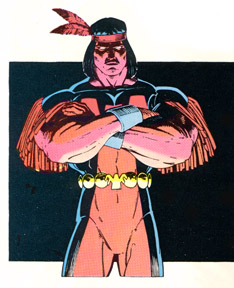Superheroes (Paperback)
Superheroes and their derring-do are no longer confined to the cartoons, as a recent "biography" of Superman and this playfully entertaining collection of superhuman adventures attest. Coeditors Varley and Mainhardt wisely avoid episodes from the established superhero pantheon in favor of those from imaginative, even twisted, superhero variations. Using Varley's own wry tale of an invincible Soviet "Bolshoiman" as a springboard, they spotlight comic-book champions' often tongue-in-cheek literary cousins, from Captain Cosmos to Captain Housework. B. W. Clough, for instance, drolly recounts "the Gazorcher's" predicament of handing over "the goggles" to his Generation X-er daughter. Michael A. Stackpole in "Peer Review," however, takes a turn toward serious action-adventure as he treats one crime fighter's apparent defection into lawbreaking and his censure by fellow superheroes. In "Reflected Glory," Paul Kupperberg soberly demonstrates how today's world would really treat a superhero when a PR man slyly uses a superhuman vigilante to further his own career. These and the other stories well may satisfy both fans and foes of the comic-book scene. --Carl Hays
Super Reader, August 3, 2007
By Blue Tyson
Varley admits in his introduction that is is not really very familiar with this sort of thing, and it would appear to show in the result. The story average is 3.28.
So, a lot of average/ordinary, and a small number that flat out really don't belong.
Still, it is by no means bad, and some good stories, just average taken as a whole, and without the shouldn't have been there stuff, would have gotten a 3.5.
In 1823 an injured hunter named Hugh Glass crawled over 100 miles through the wilderness from the Grand Valley to the Missouri River.
Thoughts on Indian superheroes
On the one hand, one could argue that these stories don't belong in a volume titled Superheroes. The first protagonist is borderline superheroic; if he counts, you could say any mythological character is a superhero. The third protagonist is merely heroic, not superheroic. The second protagonist is heroic only if you call surviving an act of "heroism."
On the other hand, it's nice to see some recognition that Indians can be heroes. That if Americans are going to mythologize Uncle Sam, John Wayne, Paul Bunyan, Daniel Boone, Johnny Appleseed, and George Washington (for telling no lies), they should mythologize Indians too. Not merely as noble savages or resistance fighters--e.g., Crazy Horse or Geronimo--but as actual heroes. So it's fitting that two of the 25 stories star Indians.
Even the Hugh Glass story, a cowboy-style adventure, incorporates Indians into the mythology. To survive, Glass must test himself against the harsh land and its inhabitants. As with Jackson's Frontier Thesis, we've defined ourselves as a nation by our interactions with Indians.
Unfortunately, Tyson's three-star rating for the book is reasonable. I agree with him that only five or so stories deserve a 4 or 4.5 of 5. Rob's rating on the usual 10-point scale: 7.0 of 10.
For more on the subject, see Why Write About Superheroes?


No comments:
Post a Comment